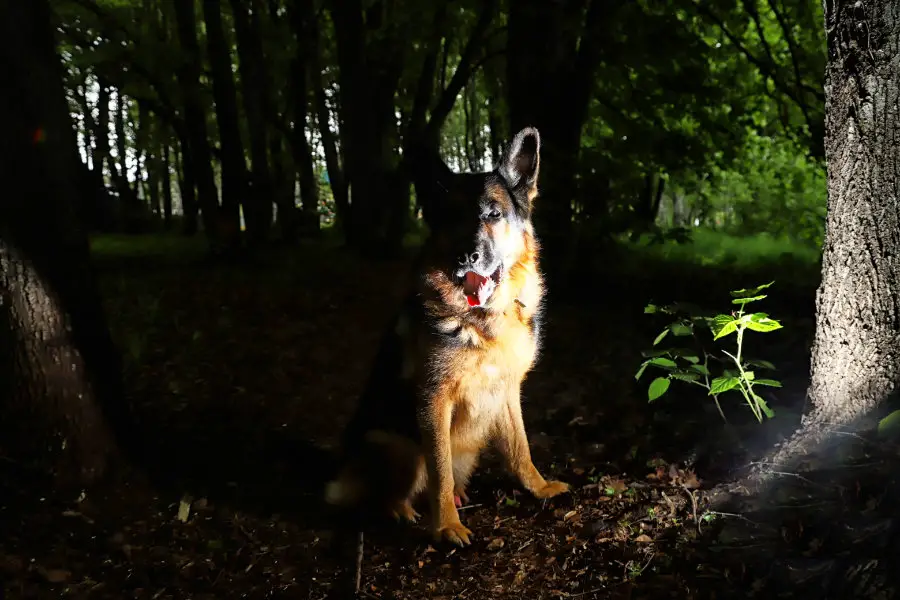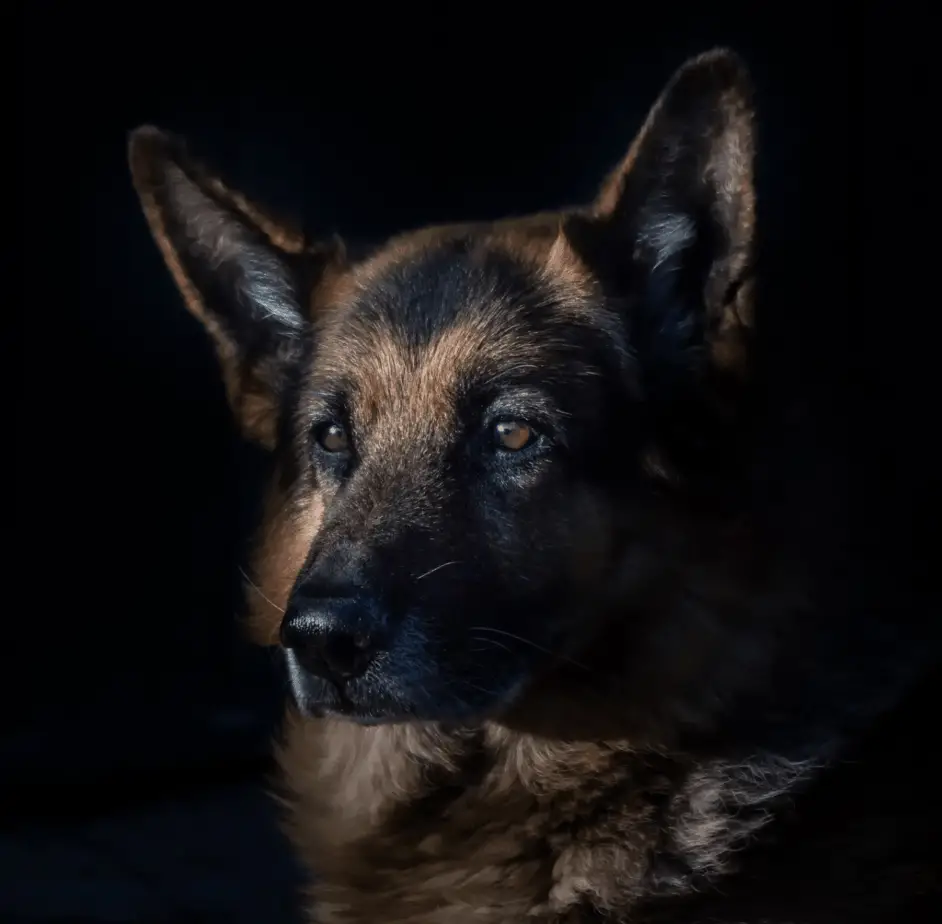German Shepherds and other dogs can “walk” in their sleep, but it is quite different from the human version of sleepwalking and can be a sign of a serious medical condition. If this is the case, getting treatment for your pet is vital.
It is important for every dog owner to understand the differences between dog sleepwalking, dreaming, and seizures. Recognizing the symptoms of sleepwalking in dogs and knowing how to tell when your dog is having a seizure can help you know whether it is time to call your vet or if your dog is just having a dream.

What Actions are Considered as Sleepwalking in German Shepherd Dogs?
While German Shepherds and other dogs do not actually sleepwalk, there are actions that they do that many people consider as sleepwalking. These actions include:
- Waking and stumbling around in a daze while acting confused or lost.
- Acting as though they do not hear commands, acting in an erratic way, walking in odd places, such as on furniture, etc.
- Being unusually aggressive and attacking other animals or people.
- Panting, drooling, and staring as if in a trance.
- Twitching, jerking, and moving their legs as if running until they jump up from sleep and run into a wall, etc.
All of these actions may seem like sleepwalking because they are similar to what sleepwalking can look like in humans. In dogs, however, this is not the true definition of the word.
What is Sleepwalking in Humans?
For humans, sleepwalking is when we walk around, talk, and even perform regular daily functions, all while sleeping. The person may or may not have their eyes open and can sometimes respond to verbal cues.
In some cases, it is as simple as a child who walks from their bed to the sofa without waking up. In extreme sleepwalking cases, someone might even try to cook or drive while sleeping, which can be dangerous.
Sleepwalking usually happens within a couple of hours after a person falls asleep. Some of the causes of sleepwalking in humans are:
- Migraines
- Fever or illness
- Genetic predisposition
- Sleep apnea
- Strange location, such as a hotel
- Medications
- Anxiety, stress, or psychological issues
- Needing to urinate
- Being touched or hearing a strange noise
There are treatments available for children and adults who sleepwalk, just as there are for canines who seem to be sleepwalking. Let’s look at the reason why dogs show symptoms that mimic sleepwalking.

Why Does My Dog “Sleepwalk?”
While we know that none of these actions are indicative of true sleepwalking in dogs, it is still important to find out why they are doing it and whether or not they will need medical intervention.
Here are some of the reasons that dogs show this type of behavior:
Neurological Issues May Look Like Sleepwalking
If your dog’s brain or nervous system is damaged or not functioning at its best, it can cause the animal to exhibit several different strange behaviors.
Barking at nothing, pacing, pushing their head against the wall, and having seizures are all symptoms of this.
While there is no need to call the veterinarian every time your German Shepherd shows strange behavior, these particular symptoms can point to serious medical issues. Scheduling a visit is recommended to rule out any neurological problems.
Cognitive Disorders Can Manifest as Sleepwalking
While the term “cognitive disorders” may sound a lot like neurological disorders, the two are not the same.
Cognitive disorders are most often caused by aging in German Shepherds and other animals.
Nicknamed “doggy Alzheimer’s” by some pet owners, cognitive decline in a dog can mimic many of the same symptoms as this devastating disease in humans. If your dog acts confused or lost, wanders around aimlessly, or isn’t acting like itself at all, you might want to call your vet.
Sleep Disorders May Also Look Like Sleepwalking
There is not a lot of verified research into sleeping disorders in German Shepherd dogs and other animals. Since dogs cannot tell us their feelings and emotions, it can be difficult to judge how their sleeping disorders work.
There are some sleep conditions; however, that may cause your dog to look as though it is sleepwalking. Narcolepsy, insomnia, and other issues can cause your dog to be extremely sleep-deprived and damage its sleep patterns.
Lack of sleep will eventually lead to cognitive issues in humans, and the same is true of dogs. An overly-tired dog might seem as though it is sleepwalking when in fact, its body and brain aren’t functioning as they should be.
Canine sleep apnea can also cause your dog to have the symptoms of sleepwalking. Since these conditions can lead to sudden death in dogs, it is important to talk to your vet if you see evidence of a sleep disorder.
What Do I Do If My Dog Sleepwalks?
As mentioned, if your dog is showing any signs of cognitive, neurological, or sleep issues, it is important to make an appointment to see your vet as soon as possible.
However, there are a few things you can do before and during an episode if your dog appears to be sleepwalking.
- Make sure that the area where your dog sleeps is comfortable. An older dog, or one that has joint or pain issues, may be missing sleep because of discomfort. Help your dog move to a comfortable location if they seem to be waking during the night.
- Be sure the area where your dog sleeps is safe. If your dog is prone to wandering around when they are supposed to be asleep, they could stumble downstairs, run into a wall, or shuffle through the doggie door and get lost.
- Keep up a regular exercise routine. While true sleep disorders won’t be miraculously healed with exercise, a regular routine can help burn off any extra energy your dog may have and lead to a better night’s sleep.
- Be sure that your dog eats a healthy diet. Just as it can in humans, a poor diet can lead to sleep issues with your dog. Do not give them sugar or caffeine, and speak to your vet about which foods are healthy for your German Shepherd.
- Keep your vet informed. As mentioned, many of these disorders can cause sudden death or serious illness. The earlier that you find a proper treatment for your dog, the better it might be for their progress.
If you awake to find that your German Shepherd is having an episode, don’t yell or do anything sudden that could frighten them.
Talk to them calmly and guide them to a safe place where you can encourage them to lie down. You may want to stay and pet them while speaking in a soothing tone until they are soundly asleep.
Conclusion
While German Shepherd dogs and other animals do not sleepwalk, they can exhibit symptoms of disorders and conditions that mimic the signs of sleepwalking. If your German Shepherd appears to be sleepwalking, it is a good idea to make an appointment with your vet to rule out any serious issues.
